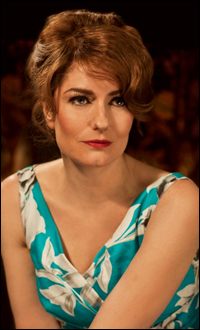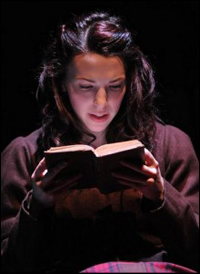
*
Once the Oliviers and the Tonys are over, and the Edinburgh Festival looms, it's time to start thinking about the upcoming season. Everything in London is upside down this year with the double whammy of Queen Elizabeth II's Diamond Jubilee, followed only a few weeks later by the Olympic Games, and the theatre too has been strutting its stuff, trying to show the millions of visitors some of what the British still do better than anyone else. But some of us, ever ungrateful, are looking forward to traffic returning to normal.
What's coming up bodes well for jaded old me, desperate for some new plays by living playwrights. The outgoing artistic director at the Royal Court, Dominic Cooke, has an autumn season marked with new work by Jez Butterworth, whose Jerusalem was an unexpected hit on both sides of the Atlantic; Caryl Churchill, whose work is often dense and difficult to fathom but always fascinating and worth unraveling; and the versatile Martin Crimp, one of Britain's most important and iconoclastic playwrights. A new play by any of these acclaimed writers could rightly be accounted an event for any theatre, but to have all three in the same season is a major coup. Butterworth's The River centers on a man and a woman during a moonless night in a remote cabin and reunites the same creative team that nurtured Jerusalem. Caryl Churchill's Love and Information apparently has 100 characters, but presumably not 100 actors, and Martin Crimp's In the Republic of Happiness is billed as "a violent satire" and set during a family Christmas.
Cooke has also planned new plays by three young playwrights whose work has caused recent sensations. It is not unusual for the Royal Court, noted for its emphasis on new playwriting for more than 50 years, to commission a first play. What is rare is for any theatre to encourage and mount productions of a second play, and this season, EV Crowe and Tarell Alvin McCraney, who had Upstairs successes at the Court in their studio sp ace last year, are now getting a second chance. Lucy Kirkwood's new comedy (her last was Bloody Wimmin) opens in October and explores power in the media.
 |
||
| Timberlake Wertenbaker |
All plays will be performed, starting this December, at the Noël Coward Theatre in the West End. This — if Grandage can pull it off, and I have every confidence that he can — will be a monumental achievement. His intention is to bring theatre's best to the widest possible audience. To that end, every performance will have 200 tickets to be sold at £10 each ($15), amounting to 100,000 tickets over the course of the season. With these plays, this director and, above all, this cast, it should be possible to attract younger people than the standard West End punters and bring back to the stalls many theatrelovers who now find the West End simply too expensive. When I ask friends who used to be regular theatregoers why they now attend so rarely, if at all, the ticket price is always the first item mentioned. Add to that a babysitter, snack or dinner, parking (and in Britain, you have to pay for your playbill!), and you've got an evening out beyond the reach of many. This new Grandage Company initiative, coupled with the now traditional National Theatre Travelex £12 seats in the Olivier Theatre, may well be one way to redress that.
(Noël Coward would definitely approve of all this activity going on in "his" theatre. After the massive hit in the West End and on Broadway of Private Lives, which starred him and Gertrude Lawrence, Gertie asked him to write another play they could do together. "Oh, darling," he protested, "I really don't want to do the same play night after night." "Fine," Gertie retorted, "then write two so we can alternate them." In the event, Coward wrote nine short plays, which he called Tonight at 8:30, and they performed three of them each evening, switching them about to suit his mood. Two were turned into movies. One, Still Life, became a classic; it is better known as the film "Brief Encounter.")
 |
||
| Anna Chancellor in South Downs. |
||
| Photo by Helen Maybanks |
The subtext of Children's Children, a new play by Matthew Dunster at the Almeida, is not very sub- at all. In fact, the environmental message it contains could, and perhaps should, be emblazoned on the Almeida's nonexistent front curtain or the front page of the daily newspapers. Whether it can be clearly understood as the subtext of a drama is the job of the attentive audience for Children's Children. The plot concerns old friends who have grown apart — one has become successful, one has not — and what happens to them over several years. There is very fine acting, as you would expect from the Almeida, and many points to ponder in Dunster's impassioned plea for action.
 |
||
| Kristin Atherton in Mary Shelley. |
Staged very simply, the only set piece being a large table that does for just about every piece of furniture, conveyance and prop, this accomplished and inspiring company, Shared Experience, has over a number of years perfected the combination of text with movement. In the case of Mary Shelley, this ideally suits the episodic nature of the action. It is rare to enjoy an evening in the theatre this much while still learning buckets about the historical people portrayed in it. (It closes July 7.)
Check out Playbill.com's London listings. (Ruth Leon is a London and New York City arts writer and critic whose work has been seen in Playbill magazine and other publications.)
*
Check out more of Playbill.com's international coverage, including London correspondent Mark Shenton's daily news reporting.










